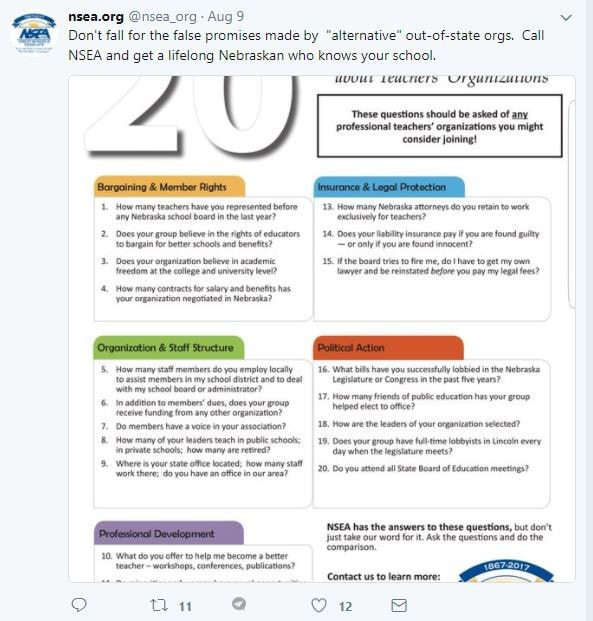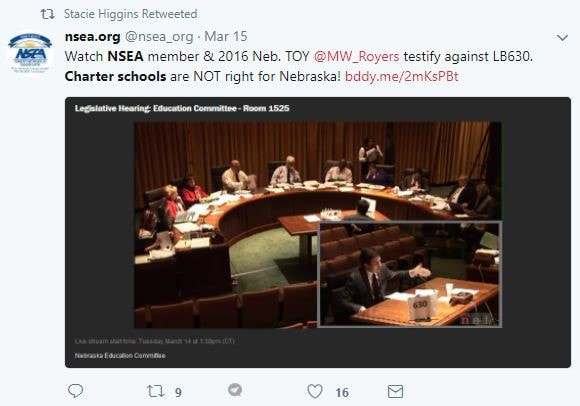|
The Nebraska State Education Association must be losing members to what they call “‘alternative’ out-of-state orgs.” They’ve been sharing a graphic on social media that includes 20 questions that “should be asked of any professional teachers’ organizations you might consider joining!” This campaign highlights the intellectual contempt with which the union treats its members. Instead of talking to Nebraska teachers like the college-educated professionals they are, the union talks down to its members and superimposes their own interests on the people whose interests they profess to represent. What are these “alternative” orgs referred to? Perhaps they’re referring to organizations like the Association of American Educators (some teachers in Nebraska join the AAE instead of NSEA). AAE is a national organization that offers a variety of benefits to its members such as $2,000,000 in liability insurance (twice as much as NSEA offers its members), legal protection, scholarships and classroom grants, and professional resources. If you look at the AAE website, you’ll notice a quite different tone. They treat their members like the professionals they are. They don’t make silly demands of them or try to scare them into taking a certain political position. Besides better treatment from their professional organization, why would Nebraska teachers join AAE when the NSEA already has their backs? Here are a few reasons: Fairweather Representation The first question Nebraska teachers are instructed to ask on the NSEA’s new graphic is this: “How many teachers have you represented before any Nebraska school board in the last year?” Undoubtedly, NSEA has “represented” teachers before school boards; however, NSEA representatives have also thrown Nebraska teachers under the bus before school boards as well. Here’s an example. In the fall of 2014, several teachers at a Lincoln middle school had concerns about comedian-produced gender spectrum handouts distributed at a teacher training meeting. They didn’t feel that their concerns would be well-received, so they approached students’ parents about addressing the topic at a school board meeting. Were these teachers represented well by the local and state teachers union? Here’s what Jenni Benson, current NSEA president and then-LEA president, had to say at that school board meeting(around the 20:00 mark): “We would like to offer our support for the training being offered to staff that includes the awareness of how to work with transgender students.” In other words, we union leaders don’t care about the concerns of the parents or the teachers who are actually in the classroom with the students. We expect all the teachers to take our position. If the organization was actually interested in “representing” the people they claim to represent, the LEA could have sent someone to the school board meeting to offer a message like this: “We recognize that this is a topic on which honest and intelligent people have many different opinions. We are here to represent our professionals but not to tell them how to think. We do have a concern, however: we don’t think it’s healthy for our teachers or their students to be working and learning in an atmosphere which squashes certain viewpoints and encourages the shaming and bullying of people who hold certain views. It's troubling that these teachers felt they couldn't express their concerns to their employers and may have even feared for their jobs simply for sharing their opinions. We encourage the school district to adopt a policy of academic freedom and to cultivate an atmosphere of respect for diversity of thought (including respect for well-established biological facts).” In summary, board representation by the NEA, NSEA, and LEA is only advantageous for someteachers. Others clearly need an alternative. Discriminatory Suggestions In Jenni Benson’s school board speech mentioned above, she also said, “LEA believes that a diverse society enriches all individuals. Similarities and differences among race, ethnicity, national origin, religion, language, geographic location, gender, sexual orientation, gender identification, age, marital status, physical size, mental ability, occupation, and economic status form the fabric of society. We believe that education should foster the values of appreciation and acceptance of various qualities that pertain to individuals as members of those diverse populations.” The NSEA’s new campaign doesn’t really subscribe to these ideals, however. On Twitter, they’ve suggested that out-of-state orgs make “false promises” and that only a “lifelong Nebraskan” or a “Nebraska attorney” can be helpful to teachers in Nebraska. This sounds an awful lot like discrimination based on “geographic location” and even “national origin.” Is the NSEA suggesting its members discriminate based on these factors? Doesn’t diversity “form the fabric of society”? Disregard for Individual Careers Professionals in all industries look for chances to improve their skills and make clear progress toward their goals. In many cases, this is done by getting a job with a different employer or trying to learn new skills in a different kind of job. In Nebraska, teachers’ careers are stifled by the lack of diverse employers. Teachers can work at traditional public schools or at private schools, but that’s about all we have to offer these professionals. In other states, teachers can also work at public charter schools, online charter schools, and a plethora of innovative new private schools that are springing up in the wake of tax-credit scholarships and education savings accounts. These school choice options offer all kinds of career development tracks that Nebraska teachers don’t have because the groups that supposedly “represent” them fight tooth and nail to maintain the tired old status quo. For example, in a school choice state, a teacher with a young family of her own can teach part-time through an online charter school and stay home with her kids for the first few crucial years. A successful older investment broker could use his college education and years of professional experience to teach economics or accounting at a magnet school, thus giving students amazing access to a rich career of experience while fulfilling his own dream of giving back to society. These scenarios are playing out all over the country--but not in Nebraska. The NSEA is using all of its resources to prevent teachers from having these kinds of opportunities.
It’s All Politics The “20 Questions” infographic put out by NSEA makes their priorities very clear. They don’t get as excited about defending teachers’ rights and providing professional development as they do about “funding,” “full-time lobbyists,” electing “friends of public education” to office, employing Nebraska attorneys, and staffing their “state office.” Some teachers are very committed to the NSEA goals, and that’s totally fine. If you’re a teacher who is into the politics of maintaining the current status quo, then joining the NSEA makes a lot of sense. But don’t buy into the rhetoric that the NSEA and LEA are all about helping you to develop your career. Their goals are to collect more dues and increase their political power. Do You Really Need a Professional Organization? There are alternative organizations out there that can provide you with professional training and resources, liability insurance, and even legal help. But do you really need such an organization? Most college-educated professionals do their jobs just fine without such organizations. If people feel they need liability insurance, they obtain a personal umbrella policy. If they want to learn more about the latest research, they subscribe to trade journals or read up on professional blogs or attend conferences that focus on their specialties. If they need legal advice, they contact an attorney. Don’t let the NSEA talk down to you and convince you that you don’t have what it takes on your own. You’re a teacher! You can negotiate your own salary and form your own opinions. Your thoughts and opinions are just as valuable as anyone else’s. School choice is as good for teachers as it is for students. Just look around the country at the fantastic job opportunities brought to teachers as a result of school choice. Jenni Benson doesn’t have a right to squash your free speech or tell you which viewpoints are acceptable. You’re not contracted to hold certain opinions just because your paycheck is issued by LPS. LPS is owned by the taxpayers of Lincoln, and the taxpayers of Lincoln are a very diverse group. Groupthink is highly overrated in general and extremely destructive in education. Use that incredible brain of yours to form intelligent opinions, and then use your teacher heart to stand up for them. Many will appreciate your valor. Finally, if you do choose to join a professional organization, don’t use the NSEA’s 20 questions for your research. Use your own. The NSEA doesn’t know you and your goals like you do. Nor do they seem to care.
0 Comments
Your comment will be posted after it is approved.
Leave a Reply. |
|




 RSS Feed
RSS Feed